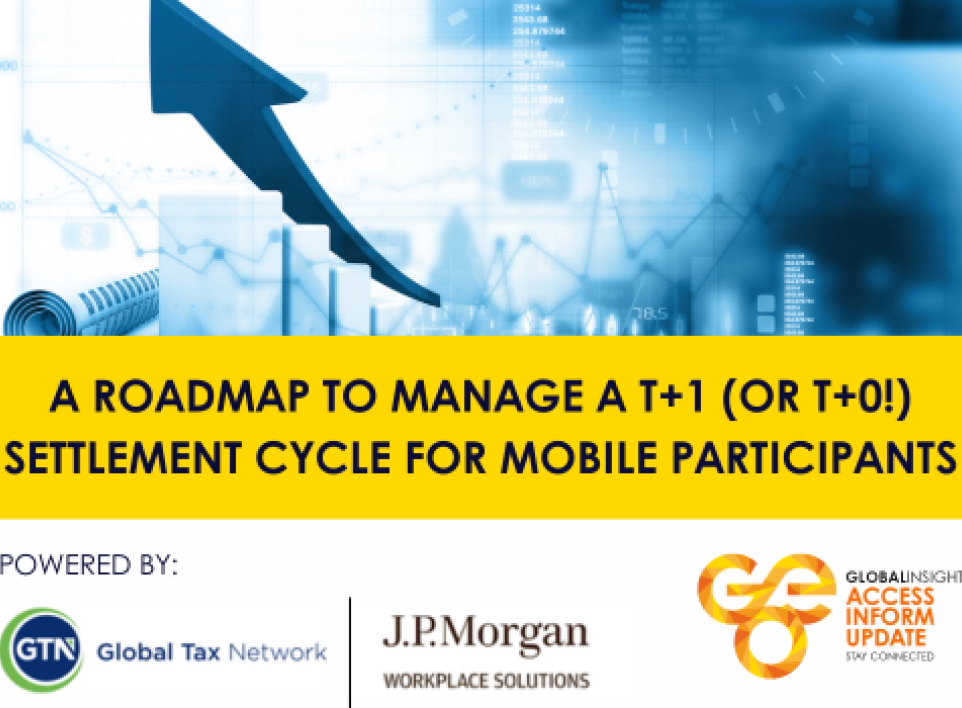In a recent webcast sponsored by Global Tax Network and J.P. Morgan Workplace Solutions, experts Tara Hagen, FGE and Chris Dohrmann, FGE, delved into the SEC's new rule that shortens the settlement cycle for equity compensation plans from T+2 to T+1, effective May 28, 2024. This change significantly impacts stock-settled RSUs, stock option exercises, and ADRs, while non-US securities, and FX transactions remain at T+2.
Adapting to T+1: Market reaction and technological adjustments
Discussing the market's reaction, Tara and Chris highlighted that companies are still adjusting to the new T+1 settlement cycle, even a month into the rule’s implementation. While some companies are well-prepared, others are struggling with the substantial process and technological adjustments required. The experts noted that transitioning to T+1 necessitates multiple intraday updates to manage the process efficiently, as opposed to the end-of-day updates that sufficed for longer settlement cycles like T+5. They also pointed out the anticipation for a potential move to T+0 by 2027, which will further intensify these demands.
Benefits, challenges, and the role of AI
Tara and Chris emphasized the dual nature of the T+1 shift, outlining both its benefits and challenges. The primary benefits include reduced risk for investors and enhanced market efficiency, with a strong drive in the US for quick asset access and control. However, the challenges are significant, especially for companies that currently lack the necessary technological tools to cope with the reduced settlement time. The experts also discussed a noted disparity in readiness between the US and Europe, with the latter showing markedly less urgency for T+1 adoption.
A particularly engaging part of the discussion was the role of AI in this new landscape. Despite 87% of webcast attendees not actively using AI in their processes, Tara and Chris made a compelling case for its importance. AI can accurately predict tax impacts and manage extensive data from mobile employees, thereby enhancing efficiency—a crucial factor in adapting to T+1.
Tax implications, compliance, and operational adjustments
The experts also explored the tax implications and compliance requirements under the new T+1 rule. Equity transactions and tax reporting need to be expedited to meet the new timelines. Tara and Chris stressed the importance of streamlining tax processes and ensuring timely updates of employee records, especially for mobile employees.
In discussing operational adjustments, they detailed the necessary changes in both the pre-transaction and execution phases. Companies must gather detailed employee information, review tax rates, monitor changes in employee status, perform testing, and consult with tax providers to ensure smooth transitions. They also highlighted the need to expedite tasks like determining market price and performing final checks post-May 2024, given the reduced latitude in managing these processes under the new settlement timeline.
Broker and transfer agent adaptations
Tara and Chris provided insights into how brokers and transfer agents are adapting to the T+1 settlement cycle. Brokers have moved to 24-hour operations, and APIs now enable multiple transactions per day. However, the shift to T+0 will require even more robust intraday settlement processes. They noted that smaller, tech-savvy transfer agents are potentially ready for T+0, pending SEC mandates and coordination with DTC and other transfer agents.
Fair market value and tax strategies
A key part of the webcast was the discussion on Fair Market Value (FMV) considerations and tax strategies. Clients often discuss and implement changes, such as moving from T+1 to T (same-day transaction). Withhold-to-cover, while previously more common due to accounting treatment issues, is cash-intensive and requires advance preparation. Sell-to-cover, despite its complexities involving settling sales to pay taxes, remains more popular. Tara and Chris observed that many clients have shifted to real-time or prior-day FMV calculations for vesting, moving away from using averages calculated on vesting dates.
Automation, employee experience, and compliance
Automation emerged as a crucial theme in the discussion, with Tara and Chris advocating for its role in ensuring efficiency and accuracy. Automation reduces manual work and associated errors, which is vital for managing state-to-state and country-to-country tax compliance. They stressed that risk mitigation is a significant driver for automation, especially with increased auditing by states facing budget constraints.
The experts also touched on the importance of simplifying the vesting and exercise processes to improve employee understanding and satisfaction. Clear, simplified explanations and ensuring employees know the reasons behind data requirements can mitigate any frustration and enhance compliance. This focus on managing and monitoring the employee experience is critical in maintaining the attractiveness of stock awards.
Poll results, readiness, and future outlook
A poll conducted during the webcast indicated varying levels of readiness for T+1 and T+0 among companies, with 46% having made changes for T+1, 9% feeling prepared for T+0 and others still working towards compliance. Tara and Chris used these results to underscore the ongoing efforts and challenges companies face in adapting to these changes.
Looking ahead, the industry is moving towards faster data availability and processing. Tara and Chris concluded by emphasizing that companies must continuously improve their systems and processes to stay compliant. The goal is to achieve seamless data integration and real-time processing capabilities to handle market and regulatory demands effectively.
In summary
The move to a T+1 settlement cycle represents a significant shift in equity compensation management, requiring advanced technological solutions, streamlined processes, and proactive tax management.
Tara and Chris underscored the need for market participants to leverage AI and automation, prepare for further reductions in settlement cycles, and ensure compliance with the accelerated timelines.
While the US leads in adopting quicker settlement processes, global coordination and readiness remain critical challenges.
ABOUT OUR SPONSORS
Global Tax Network
When partnering with GTN, companies gain access to over two decades of specialized mobility tax expertise tailored to support their global expansion. Founded in 2000, GTN empowers clients to navigate the complexities of mobility with confidence. Businesses benefit from seamless, best-in-class mobility tax solutions that address their unique challenges across 150+ countries. GTN's client-first approach ensures that mobile employees feel supported throughout their international journeys.
Companies experience streamlined processes, proactive cost-saving initiatives, and comprehensive compliance support, all delivered through a combination of personalized service and cutting-edge technology. With GTN, businesses can focus on their global growth strategies while leaving the intricacies of mobility tax management in expert hands. To learn more about how GTN can support your global mobility needs, visit gtn.com.
J.P. Morgan Workplace Solutions
J.P. Morgan understands that your company’s success is driven by the remarkable commitment and dedication of its employees.
Workplace Solutions is a holistic tech and service-based offering, created to empower your team to easily navigate their workplace incentives with confidence.
From stock plan management powered by Global Shares and financial education to wealth building and beyond - our intuitive solutions help you attract and keep talented people who believe in your company as much as you believe in them.
Contact us today to find out how we can help empower your workforce.




